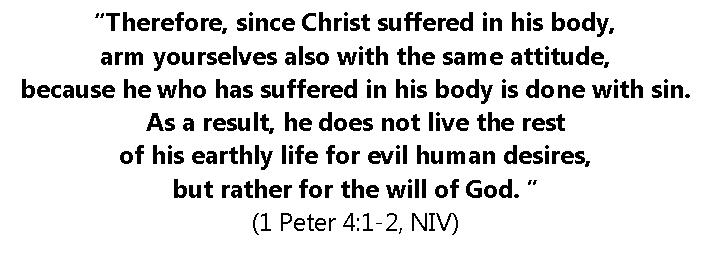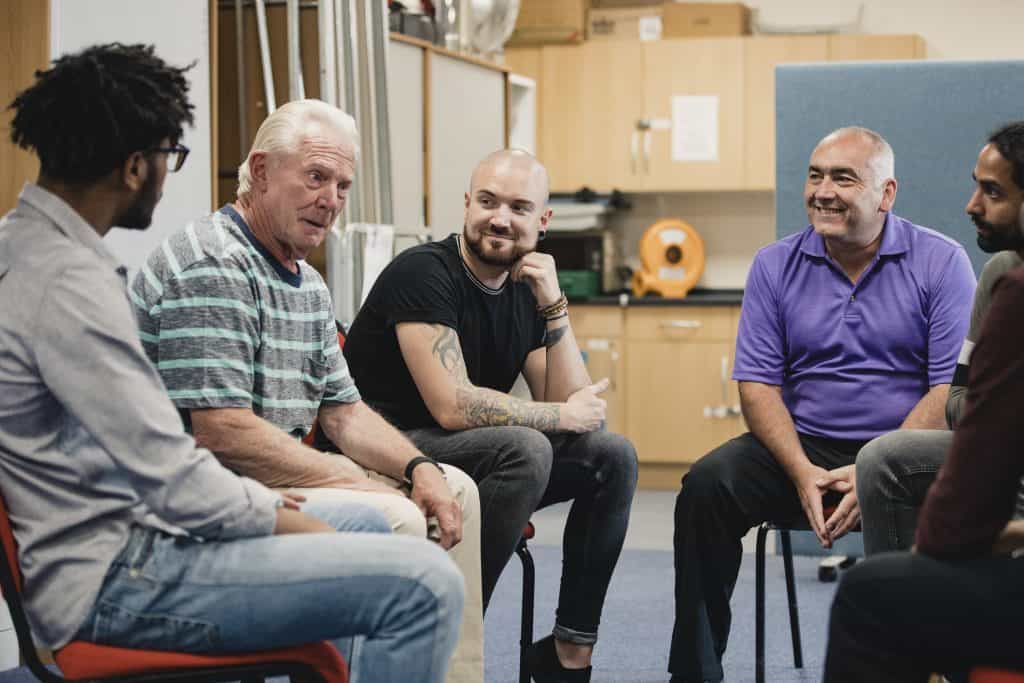I spend a good portion of my day reading thoughts from people who are caught in habitual sin. Many can’t seem to break free from the grip of pornography. Others wouldn’t call themselves “addicts,” but they are faced with the temptation to view porn on a regular basis: it is a real struggle for them.
Where are the Christians Peter describes in the text above, those who are “done with sin”?
Face to Face with Martyrdom
Recently my wife and I had the privilege of hosting a man from out of town who came to speak at a local conference. His name is Getaneh, and he is from Ethiopia. Getaneh sat at my dining room table and told us stories of his conversion, and his adventures traveling the world speaking about Christ. He also told us stories about being arrested by Communist authorities under the Mengistu regime in Ethiopia. While in prison Getaneh was under extreme pressure to renounce his faith in Christ, being denied food, water and sleep, and repeatedly tortured and beaten.
One time his captors forced him, along with a whole group of Christians, to crawl on hands and knees back and forth across jagged stones. A pregnant woman among them began going into labor but the guards would not let her stop crawling. She delivered the baby right there on the rocks. Then the guards wouldn’t let her cut the umbilical cord or stop to care for baby. She was forced to continue crawling, the baby being dragged behind her. Her baby died. All the while the Christians continued crawling on their bloody hands and knees, encouraging one another by singing “I Have Decided to Follow Jesus.”
A Martyr’s Heart
Among those who regularly suffer great physical losses for their faith in Christ, whether it be great poverty, persecution, imprisonment, or death, are people who undergo a profound transformation of how they see the lusts of this world. Those who live for Christ in spite of suffering have made a clear break with the life of sin. I believe this is the heart of Peter’s statement: “he who has suffered in his body is done with sin.”
Coming face to face with extreme losses for the sake of Christ forces one to make some quick reassessments. Is Jesus worth losing everything, even my life? Is He the true Judge and Lord of my life? Is knowing and loving Christ worth the loss of all things?
The martyrs expose in us a deep sin. Those who have been tested and tried by extreme circumstances show us that fighting against sin involves great sacrifice. Those who have been literally willing to lose limbs in the cause of Christ expose in us our unwillingness to cut off our right hand or gouge out our right eye in the battle against lust (Matthew 5:27-30). May God have mercy on us for our slothful, cheapened version of Christianity. Our brothers and sisters sit in prisons around the world, losing health, comfort, family and freedom, and yet we still complain about the idea of giving up cable TV for the sake of our purity.
The martyrs give us a glimpse of the heart of Christ, who wholeheartedly dedicated Himself to God’s service, even when that meant death. This Christ-like readiness to die was, to Peter, like a mental armor. Like well-armed soldiers in Christ’s service, we are to have a martyr’s heart. Ready for attacks from the enemy and ready to pay the price for allegiance to our King.
Slavery to Sin
Facing death is not just the reality of Christian martyrs. It is something we all face.
There is a thought-provoking passage in the book of Hebrews that speaks directly about death and ties it to our slavery to sin:
“Since therefore the children share in flesh and blood, he [Christ] himself likewise partook of the same nature, that through death he might destroy him who has the power of death, that is, the devil, and deliver all those who through fear of death were subject to lifelong bondage” (Hebrews 2:14-15, NRSV).
Here are John Piper’s thoughts on this statement:
“Have you ever asked yourself how much addiction and personality dysfunction and disordered lifestyle may originate in the repressed fear of death? Very few people live their daily lives with the conscious fear of death in their minds. Yet this text says that Christ came to die for people ‘who through fear of death were subject to slavery all their lives.’ There is something profound here. The point is not that people are enslaved to a constant, conscious fear of dying, but that they are enslaved to a thousand ways of avoiding this fear” (Future Grace, p.354).
In other words, the fear of death is something we repress and deny through numbing addictions and compulsions. Is this true?
Mortality is the equalizer of all humanity. Knowing that this life is temporary and coming to an end is one of the most sobering thoughts we all face. Facing our own mortality forces the average person to ask a series of questions: is there life after death? what lies beyond this life? when I die what becomes of anything I’ve gained or lived for or earned?
Many sins are the means of ignoring that our time in this life is short. Mottos like “Let us eat and drink, for tomorrow we die” (1 Corinthians 15:32) and “Relax, eat, drink, be merry” (Luke 12:19) are the soul’s vain attempts to numb our fear of death’s looming nearness. No telling how many of our compulsive behaviors and addictions, how many of our strivings for success, security, pleasure, and approval are ways to squeeze the most out of a life we know is coming to an end.
This passage in Hebrews speaks of how Jesus came to release us from the power of death and therefore the fear of death. When the eternal Son of God came in human flesh, he did so to share in our humanity and experience death. His death gives assurance to all who believe in Him that any sin on our record has been expunged, and God’s entire wrath for our sin has been absorbed by Christ on the cross. For those who believe, there is nothing to fear beyond death.
As Christians we embrace both the sobering reality of our coming death, knowing this life is temporary, and we anticipate with an eager longing for the day of our resurrection. As this hope grows in us a value shift begins to take place, a shift that releases us from our slavery to sin. Our anticipation of Christ’s return and our complete redemption is the catalyst for purity:
“See what kind of love the Father has given to us, that we should be called children of God; and so we are. The reason why the world does not know us is that it did not know him. Beloved, we are God’s children now, and what we will be has not yet appeared; but we know that when he appears we shall be like him, because we shall see him as he is. And everyone who thus hopes in him purifies himself as he is pure” (1 John 3:1-3).








Beautiful, the Lord has given you a blessed gift, that of being a revelator. Please continue to give yourself to His outpouring and your obvious much study.
KEEP EDUCATING US, I HAVE NO FEAR BECAUSE CHRIST
HAS ABSORBED MY SINS AND DEATH IN CHRIST DEATH.